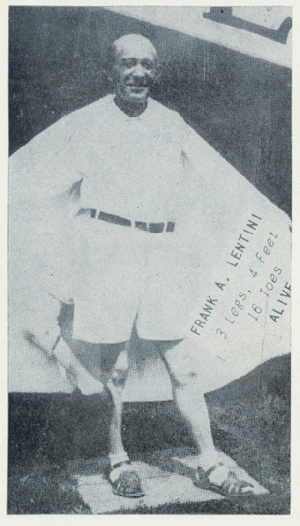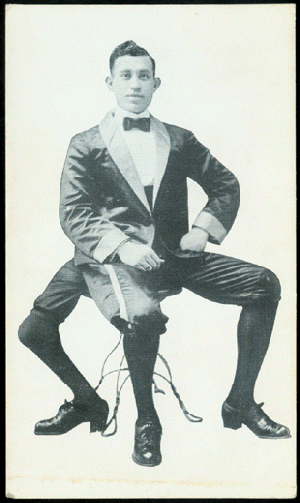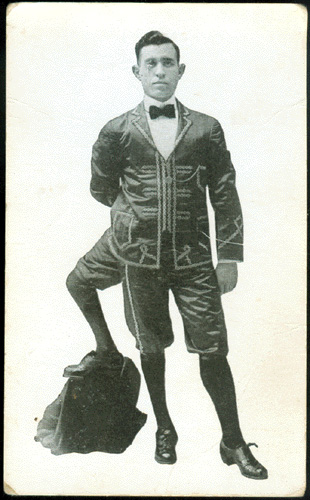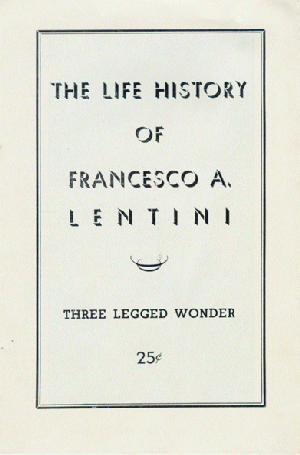|
THE LIFE HISTORY OF FRANCESCO A. LENTINI,
THREE LEGGED WONDER
pitchbook pamphlet, 6 pages of text with one photograph, circa
1940
Frank Lentini, the King of the Freaks, told his own story in
this pitchbook he sold during his act. Lentini used this opportunity
not only to talk about his unique anatomy, but also to preach his own
ideas about good hygiene and healthy sexual practice — or as he calls
it, “the vital truths of sex life.” Obviously, Lentini saw himself as
much an educator as an entertainer. The words are his own (at least
the autobiographical portion), presented here just as they appeared
when Lentini was working the midway in the middle of the last century
— 3 Legs, 4 Feet, 16 Toes, ALIVE:
I am the subject of the present sketch. I was born in Rosolini
in the province of Siracusa, Sicily, in the year 1889. I am of a
family of twelve children (seven sisters and five brothers, who are
all ordinary appearing people, there being nothing unusual in their
personal appearance or physical characteristics).
Indeed, careful investigation does not reveal any peculiarity
in any of my ancestors either on the maternal or paternal side of my
family.
I am often asked the question, "What is the cause of my strange
condition?" I have appeared before the leading medical world in Europe
as well as in the United States, and the only cause that they can give
me is that my mother gave birth not to three children, but more than
one, yet not three.
Up to the age of six I was able to extend the third limb so
that it was possible for me to reach the floor with it, but was never
able to use it for walking purposes, but strange as it may seem at the
end of the sixth year my body started outgrowing the third limb, so that
at the present time you will notice that it is six or seven inches shorter
than the two limbs that I stand on. And furthermore, you will notice,
that none of my limbs are alike – yet, I have three and yet haven't a
pair.
Often people look at me and pass the remark, "Isn't that too
bad!" But I am here to tell you that there are lots of people in
the world who are a great deal worse off than I am, who have far less
to live for, and who have but a fraction of the pleasure that I get
out of life.
When I grew to the age when boys are allowed to go out of doors
to play it was then that the realization came to me of my usual peculiarity,
and naturally, I grew a little despondent about everything. My parents
were fairly well to do and I had every comfort and was not neglected,
but I began to grow unhappy, nevertheless.

But one time I was taken to an institution where I saw a number
of blind children and children who were badly crippled and otherwise
mistreated by fate, and then and there I realized that my lot wasn’t
so bad after all. Even though a child, I could appreciate the fact that
I was possessed of all my faculties and senses. I could hear, talk, understand,
appreciate and enjoy the beauties of life. I could read and they couldn’t.
I could talk to my friends, but some of them couldn’t because they were
dumb. I could hear and enjoy beautiful music, while some of them couldn’t
because they were deaf. I had my mental faculties and began to look forward
to my education, and some of them couldn’t because they were idiots. The
visit to that institution, unpleasant though it was because of the misery
that I saw, was the best thing that could have happened to me. From that
time to this I have never complained. I think life is beautiful and I
enjoy living it.
When I was quite young my family moved to America. Wherever
we went I was, of course, considered a curiosity, and while at first
their curious, critical gaze was considerably embarrassing, I gradually
became used to it. It was natural for everyone to suggest to my parents
that I be put into the show business, but my father said "No," emphatically
– at least until I should have gained an education. He said he could forsee
[sic] eventually that I might travel, but that he would not allow it
until I had the benefit of an education.
I am often asked the question if I know of any other case of
my kind, of anyone being born as I am. Yes, I knew of two three-legged
cases, and two four-legged cases — the three-legged being males, and
the four-legged being females — but none of these had a normal extra lower
limb, and none had control of their extra limbs and in fact they had all
they could do to get around on their normal lower limbs. Only one of these
lived to an old age, and that was Mertle Corbet [sic], the four-legged
woman.
No, my limb does not bother me in the least. I can get about
just as well and with the same ease as any normal person — walk, run,
jump; ride a bicycle, horse; ice and roller skate; and drive my own
car. I can swim — one advantage I have over the other fellow when I swim
is that I use the extra limb as a rudder. I am sometimes asked how I buy
my shoes; well, here’s how: I buy two pairs and give the extra left shoe
to a one-legged friend of mine who had the misfortune to loose his right
leg, so you see very time I buy a pair of shoes I really do a good deed
along with it. Another question often asked is, “Does the extra limb
bother in sleeping?” It does not; I can lie on my back or either side
of my body without any hardship or loss of sleep.

Frank Lentini
cabinet card, 6 x 3.5 inches, circa 1920
photographer: unknown
Of course, it was a great shock to my parents that I was born
as I was, but when they found that I was perfectly normal every other
way they, too, began to be philosophical about it. I have been traveling
for the most part of my life and must say that I enjoyed it very much.
OBEY NATURE’S LAWS!
The purpose of this volume is to give in concise form, and
in plain, clean, common-sense language, the all-important information
about sex and procreation and the appertaining law of health and hygiene
as established by the best modern authorities.
Primarily intended for wives and mothers, it will be found
of special value as well to parents and educators who desire to teach
the rising generation the vital truths of sex life. How to teach these
truths has been a vexing problem to teachers and parents, and a modest,
compact and scientific exposition, such as this presents, has long been
needed.
In all the vast realm of knowledge there is no subject of greater
importance. Unfortunately for the well-being of mankind, there is no
other subject upon which the great majority are so densely ignorant.
A veil of mystery and prudishness has been cast over these vital facts
and truths. But the innocence that is innocent only through ignorance,
is in danger of being lost through ignorance, and therefore, of little
value or merit, like any other virtue that is virtuous only because it
has never been tempted. It is not necessary to give examples. It is the
duty of parents to instruct the young and thereby fortify them against
a fall into a terrible sin through ignorance. This volume is intended
to be placed in the hands of the innocent by their parents. It was written
both from a pedagogical and from a medical point of view.
That portion of this work relating more particularly to health
and hygiene is based on the principle that "whatever lowers the vital
force of a well person will never restore the vital force of a sick
one." Every disease is the result of a violation of some natural law.
Every such violation is a wrong, and as an addition of two negative quantities
cannot make an affirmative, so two wrongs can never make a right.
This is common sense, and the following fundamental principles are becoming
daily more and more recognized by enlightened people both in and out
of the medical profession:
POISONS ARE NOT REMEDIES.
Symptoms and pains are not disease, but only the messengers
bringing warning of disease to the brain. To silence the messengers
and leave the disease unchecked is folly.
Prevention is better than cure. The great elements of prevention
are: (1) Knowledge; (2) Cleanliness, Physical as well as moral and mental;
(3) Hygiene and sanitation.
Mind and thought influence the bodily health no less than physical
and material conditions. A healthy body needs a mind, and a healthy
mind cannot exist without a healthy body.
THE PUBLISHER
The Mother During Pregnancy
The development of the foetus requires that the uterus shell
become enlarged accordingly. This occurs by the increase in extent
of all its parts, especially in the enlargement of the body of the
uterus, by which portion the young child is surrounded. The muscular
fibers appear to increase in length and width, and also in number; the
circulatory vessels enlarge; the nerves and other parts accommodate themselves
to the gradual expansion of the structure. As the uterus and its contents
become greater in size, the entire abdominal region of the mother becomes
extended.
This season is one of deep import to the mother, for in it
she is fulfilling one of the supreme functions of woman and is sustaining
one of the greatest of human trials. Two lives are dependent upon
the proper completion of gestation and the successful birth of the offspring.
She deserves from herself and those about her the exercise of the greatest
good judgment in taking care of herself. She should eat moderately of
wholesome food, neither overtaxing her digestive organs by eating too
much, nor permitting herself to lose strength from need of nourishment.
Her best diet will consist of grains, vegetables and fruits; especially
should she eat liberally and regularly of the ripe fruits is season,
such as please her taste and agree with her digestion.
A regular fruit diet does more than anything else can do to
prevent and relieve constipation. If she will eat properly she need
not resort to the use of medicine. The pregnant woman is not necessarily
a sick person because of her condition. She may be just as well and active
during this period as at any other time of her life. If she take proper
exercise she will have sufficient appetite, and she will have no concern
about not being able to eat enough; she will more often cause herself
to be distressed from eating too much than from eating too little.

Frank Lentini
cabinet card, 6 x 3.5 inches, circa 1920
photographer: unknown
The pregnant mother should dress with proper regard to her
condition. While she should clothe herself comfortably as respects
temperature, she should relieve herself of heavy clothing as much as
possible, and especially alter such garments as is the last degree bind
her body closely. Loose, light clothing about the abdominal regions
is absolutely needful for both her own relief and to permit the enlargement
and changes of position that must occur in these parts. Not only should
the clothing be loose, but all its weight should be suspended from the
shoulders. To attempt to hide or hinder the natural increase in the abdomen
by means of the corset or closely fitting dresses, is to invite other
troubles of much more serious character. Any tightening of the region
of the waist must press the increasing organs down into the lower part
of the abdomen and pelvis. Such a course cannot fail to deform the body
more and cause weakness and pain in the back.
The mother in her child-bearing should take proper exercise
daily. It is only by reasonable and regular exercise that she can maintain
the vigor of all her parts. She may walk, ride, work. She should
be much in the open air and sunlight. She should avoid idleness, cheerlessness,
distress and despondency as she would shun contagion, for they cannot
but contribute toward making her condition worse. There is no better
exercise than that of regular ordinary work and that of walking in the
open air. Agreeable occupation, constant employment, busy cheerfulness,
are the surest means of avoiding both mental and physical depression.
She should not exercise excessively nor violently; she should avoid any
sudden or heavy strain; should avoid any great excitement; she should
receive no sudden shock; she should be shielded from fright, anger or
abuse, or from anything else that endangers her life. Anyone who would
do her the least violence, by word or deed, while she is in such a condition,
is too brutal to be worthy to wear even the image of a human being.
Cultivate bodily health by persistent exercise in the open
air, by moderation in eating and drinking, by cleanliness, by proper
amount of sleep and recreation. Give the lungs full breath, and cherish
fresh air and sunshine as the richest of vital gifts to man. Dress
with regard to judgment rather than in obedience to fashion.
Regard the physical body as the delicate and beautiful instrument
through which the soul acts, in which it dwells and upon whose vigor
and healthfulness the spiritual part is dependent for its own vigor
and health, upon which it depends for growth, for happiness and for power.
Know, too, that the most sensitive and responsive of all physical
parts are the sexual organs. Keep these within proper control; use
them as nature intends and good judgment dictates. One can no more afford
to abuse the sexual function than he can afford to destroy the brain.
Aim to live temperately, chastely, virtuously. Shun dissipation; cleave
to the noble purpose.
ILLICIT INTERCOURSE
"Virtue is the health, the good habit, the beauty, of the soul;
vice is its disease, its bad habit, its deformity." – Plato.
Considered upon strictly physicological grounds, there is no
difference between the sexual union of persons who are married to
each other and a similar connection between persons who do not sustain
this relationship. But the social and moral interests of enlightened
people decide that, while marriage is wholesome, illicit intercourse
of the sexes is one of the grossest of evils.
However wrong promiscuous intercourse may be and for whatever
reason it may be evil, such sexual union is equally so to both of the
parties engaged in it. The man who seeks the indulgence, who sues for
the gratification of his passions, is as guilty of wrong and is as much
degraded by the act as is she who yields to his inducements and shares
the corruption with him; in truth, there are reason for considering him
the more culpable, since he is usually the stronger of the two; he is
the one who appears the seducer, while her weakness and her necessity
may to some extent excuse her.
A woman’s choicest treasure is her virtue; in sacrificing her
chastity she destroys the jewel of her crown; her purity is her strength
and protection. So forcibly does this view of woman’s worth prevail
in the enlightened world that it would be better for her to suffer unto
death and render up her life in virtue than from any inducement whatever
to enter upon a life of illicit intercourse. The sense of degradation
which an unvirtuous life brings will, to a sensitive person destroy all
happiness, and tend even to destroy health and life as well.
PHYSICOLOGY OF SEX LIFE
Humanity is divided, in relation to physicological laws into seven
stages:
1. Fetal life, from conception to birth;
2. Infancy, from birth to the time of appearance of the first
teeth;
3. Childhood, from the first to the second dentation;
4. Boyhood or girlhood, from second dentation to puberty;;
5. Adolescence, from puberty to maturity;
6. Manhood or womanhood, from maturity to old age;
7. Senility, lasting until death.
It is very important that we all have a clear understanding
in regard to these various stages in order to live aright. The two
most important are adolescence and maturity, or the periods characterized
by an active sexual life.
While the natural tendencies toward sexual excitement are great
during this period, it must not be overlooked that it may be in no small
measure to be due to some local irritant, such as a too tight or too
loose foreskin or an adherent clitoris. There are various other causes
that might contribute toward this condition, such as hemorrhoids, worms
in the rectum, etc. The circumcision of boys will often effect a cure
in these cases, and a careful examination should be made in all cases
so as to remove the cause if it is a mechanical one; likewise to break up
the adhesions of the clitoris will often afford the greatest relief to girls.
It is, therefore, of the utmost importance that the child is given a
thorough education in self-control and instructed in regard to the irreparable
dangers arising from a violation of the important laws of Nature.
The same laws which control reproduction in mankind, also exist
in animal and vegetable life. The pride of the male bird in his beautiful
plumage and melodious voice, the cock’s comb, the horns of the stag
and the lion’s mane, are all manifestations of his sexual instinct,
causing a fondness for appearing well in the eyes of his mate. In
vegetable life, fertilization is as necessary for reproduction as it
is in man, the two sexes being just as essential to the propagation
of plant life. It is, however, disseminated in a different manner.
In some varieties the pollen, or male element is carried to the female
by the wind for fertilization. These are called "windbearing" plants,
and are quite numerous in plant life.
The Marriageable Age. Girls are said to have attained development
at the age of eighteen years, and boys at the age of twenty-one though
marriage should not be entertained before the twenty-second and twenty-fifth
years, respectively, as complete maturity is not reached before that
time, and if a woman enter the married state before complete physical
development has been attained, she is unfit for motherhood; neither
are her mental powers sufficiently developed tom permit her to assume
the responsibilities of motherhood. Not only this, but abortions are
liable to occur should impregnation take place before full development.
Reproductive powers consist not only in being able to produce children,
but in nourishing them after they are delivered therefore the lacteal glands
should be fully developed.
Change of Life. This change, also called the "menopause" or
"climacteric," normally occurs at the end of the thirtieth year of
procreative life, which is about the forty-fourth year, varying according
to the time at which the first menstruation appeared, state of health,
and various other influences. If a girl menstruates at twelve years
of age, then the change of life should occur at the forty-second year,
or if she should not menstruate until the sixteenth year, the menopause
would naturally be delayed until the age of forty-six, thus making the
child bearing period thirty years. This change is commonly applied to
women alone, but as a matter of fact, men pass through a change also,
being less marked physiologically than in the female sex. The menopause
is the period which determines the state of health for the balance of
life; that is, if this time is safely passed, the individual will enjoy
better health than before, or it may be the beginning of suffering for
the rest of their lives. But even the best, they are on the down-hill
of life, the sexual organs become smaller, and the tissues all over the
body lose their elasticity and recuperative powers. The peculiar features
which result in sterility after the change are the cessation of ovulation
in the female and absence of spermatozoa in the semen of the male.
Thus it is that years rob the individual of physical growth
and development and the power of reproduction, yet the mental attributes
may be developed to a wonderful degree after this change has taken
place, and often a keener interest in intellectual pursuits is enjoyed
more than ever before.
My tribute to Frank Lentini, Francisco Lentini as a Lutenist, may be seen
here.
|



